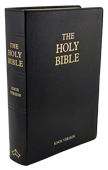The Holy Bible – Knox Translation
The Epistle of the Blessed Apostle Paul to the Romans
|
Chapter 7
|
1
You must surely be aware, brethren (I am speaking to men who have some knowledge of law) that legal claims are only binding on a man so long as he is alive.
2
A married woman, for instance, is bound by law to her husband while he lives; if she is widowed, she is quit of her husband’s claim on her;
3
she will be held an adulteress if she gives herself to another man during her husband’s lifetime, but once he is dead she is quit of his claim, and can give herself to another man without adultery.
4
Well, brethren, you too have undergone death, as far as the law is concerned, in the person of Christ crucified,✻ so that you now belong to another, to him who rose from the dead. We yield increase to God,
5
whereas, when we were merely our natural selves, the sinful passions to which the law bound us worked on our natural powers, so as to yield increase only to death.
6
Now we are quit of the claim which death had on us, so that we can do service in a new manner, according to the spirit, not according to the letter as of old.✻
7
Does this mean that law and guilt are the same thing? God forbid we should say that. But it was only the law that gave me my knowledge of sin; I should not even have known concupiscence for what it is, if the law had not told me, Thou shalt not covet.
8
But the sense of sin, with the law’s ban for its foothold, produced in me every sort of concupiscence. Without the law, the sense of sin is a dead thing.
9
At first, without the law, I was alive; then, when the law came with its ban, the sense of sin found new life,
10
and with that, I died. The ban, which was meant to bring life, proved death to me;
11
the sense of sin, with the law’s ban for its foothold, caught me unawares, and by that means killed me.
12
The law, to be sure, is something holy; the ban is holy, and right, and good.
13
A good thing, and did it prove death to me? God forbid we should say that. No, it was sin that produced death in me, using this good thing to make itself appear as sin indeed, sin made more sinful than ever by the ban imposed on it.
14
The law, as we know, is something spiritual; I am a thing of flesh and blood, sold into the slavery of sin.
15
My own actions bewilder me; what I do is not what I wish to do, but something which I hate.
16
Why then, if what I do is something I have no wish to do, I thereby admit that the law is worthy of all honour;
17
meanwhile, my action does not come from me, but from the sinful principle that dwells in me.
18
Of this I am certain, that no principle of good dwells in me, that is, in my natural self; praiseworthy intentions are always ready to hand, but I cannot find my way to the performance of them;
19
it is not the good my will prefers, but the evil my will disapproves, that I find myself doing.
20
And if what I do is something I have not the will to do, it cannot be I that bring it about, it must be the sinful principle that dwells in me.
21
This, then, is what I find about the law, that evil is close at my side, when my will is to do what is praiseworthy.✻
22
Inwardly, I applaud God’s disposition,
23
but I observe another disposition in my lower self, which raises war against the disposition of my conscience, and so I am handed over as a captive to that disposition towards sin which my lower self contains.
24
Pitiable creature that I am, who is to set me free from a nature thus doomed to death?
25
Nothing else than the grace of God, through Jesus Christ our Lord. If I am left to myself, my conscience is at God’s disposition, but my natural powers are at the disposition of sin.✻


